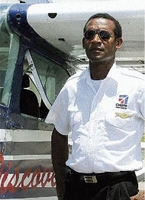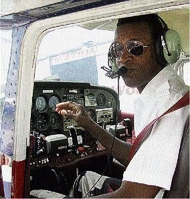Captain Errol Stewart - Flying in the face of hard times
Published: Friday | May 22, 2009


Captain Errol Stewart, CEO of Caribbean Aviation Training Centre in Kingston. - photos by Avia Collinder
Captain Errol Stewart credits his eight years at the helm of the Caribbean Aviation Training Centre (CATC) and Cessna Pilot centre with good business decisions and a life-long love of flying, which has seen him through the best and the worst of times.
Today, with more of his students having difficulty in paying the more than $1 million that it costs for the basic private pilot's licence, and with the ever present threat that Tinson Pen will be sold and flight facilities changed to smog-prone Ferry lands in St Catherine, he is still optimistic.
The sky is, well, the limit for the aviation training business, this former army officer believes.
He speaks confidently of the over 600 graduates of his flight training centre and 2006 award given to CATC by Cessna for the best run centre among 300 globally and the worldwide demand for his privately and commercially trained students.
Training period
A private pilot's licence takes about eight months of instruction, while a commercial pilot spends about 20 months in training.
CATC now has about 90 private students and less than 10 commercial pilot trainees in its programmes.
The 49-year-old pilot and flight instructor has come a long way, since the days when he did odd jobs in exchange for his very first flight lesson as a teenager.
"I washed planes in exchange for lessons," says Stewart who attended Kingston Technical High School and subsequently worked with the Jamaica Defence Force for a decade before he trained with Embry Riddle aeronautical university in the United States and the Cessna Pilot centre.
CATC was started in 2001 with ex-army colleagues and has survived in spite of the need to cut training charges for Jamaican clients.
Plans are in place, the CEO notes, to offer a degree programme in conjunction with Mountain State University in the United States.
He continues to bend backwards, he says for parents who desire their children to have a pilot licence, although some he notes have absconded with money owed.
The current plans by the Jamaica Civil Aviation Authority - with which Stewart frequently is at loggerheads about rules affecting private craft - to establish its own training school may be one sign that all augurs well for the future of the aviation training centre.
As reported on the Jamaica Civil Aviation Authority's website, Jamaica is in the process of entering into an agreement with the Air Transport Training College of Singapore to set up a similar institution here in Jamaica.
Under this agreement, prospective students will be trained to become certified aircraft technicians.
On completion of their training, these technicians would become available for employment in the local industry where such skills are short.
There will also be the possibility of this institution being used as a 'feeder' for the global industry.
Although the September 11, 2001 terrorist attacks on the United States, referred to as '9/11', and subsequent oil price escalation led to bankruptcy and cutbacks among many commercial airlines, Captain Stewart says the results have been the very opposite for business aviation.
"There has been over 80 per cent increase in business aviation since 9/11," he said.
He adds that in the last three years, 15 new aircraft have arrived in the island for companies including, National Bakery, Ritz Carlton, Tim Air and Tara Couriers.
Companies, he notes, have been buying planes and entering into time-share agreements with other firms in a bid to escape the long delays created by new security regulations at airports since '9/11'.
Indeed, he said, what has prevented the presence of more private aircraft locally was red tape involved in the registration of these craft under JCAA regulations.
Efforts at comment from JCAA were unsuccessful.
Stewart said that he and others affected have been lobbying for changes and have asked the US Federal Aviation Administration to intervene.
He is also disgruntled about the Government's indecision about the fate of Tinson Pen aerodrome, saying those plans have made it difficult to access loans.
The aerodrome is being relocated to make way for expansion of the shipping port.
Relocation site proposed

Captain Errol Stewart
He also notes that the proposed site of relocation at ferry is across from the landfill and prone to south eastern breezes which could produce frequent smog and make flight training difficult.
While the Caribbean Aviation Training centre is now the only one of its kind in Jamaica - subsequent to the scaling down of operations at Wings Jamaica with the retirement of owner Carl Barnett - Stewart says some shrewd decisions has allowed him to keep his doors open.
He and other staff have endured a pay cut while the school has acquired its own fuel truck in a bid to reduce the overall high cost of aviation fuel, which has increased significantly.
The fuel price has now stabilised at US$55 per flight which is still high.
Such expenses, the captain notes are behind the pricing for a private pilot licence, which costs US$14,000 or J$1.26 million. The commercial pilots licence costs US$34,000 or J$3.2 million.
Operational costs, the captain states also includes books purchased abroad, craft and maintenance.
But: "We are still cheaper than the US training schools when you consider boarding and food costs," Stewart said.
Students apply yearly in the ratio of 30 per cent female to 70 per cent male.
avia.ustanny@gleanerjm.com
















